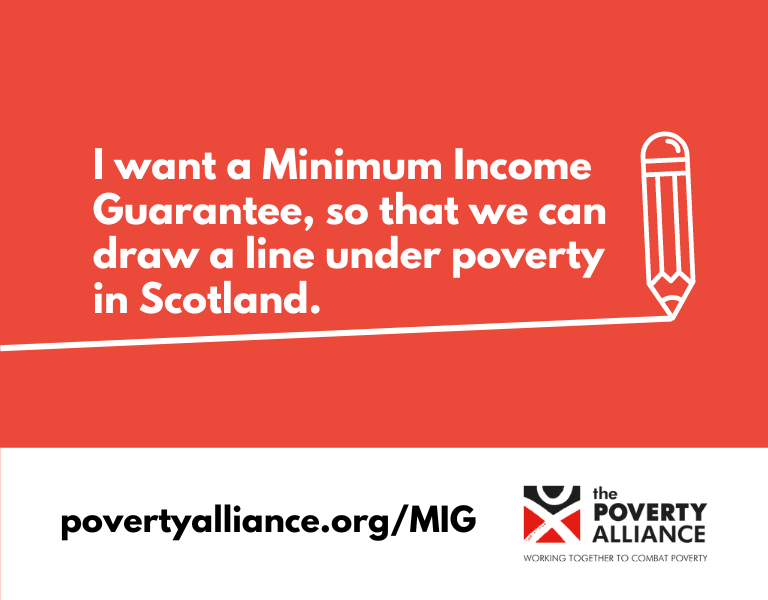
Ruth Boyle, Policy and Campaigns Manager, The Poverty Alliance
We built our social security system so that everyone — especially those who most need it — can have stability and freedom to build a better future for themselves and their households.
But over the last few decades, governments have weakened our social security. When the covid-19 pandemic and rising costs hit us all, social security hasn’t been strong enough to keep people on already low incomes from falling into debt and destitution.
That has to change.
The Minimum Income Guarantee (MIG) is a way that we can return justice and compassion to our social security system. It is the way that turn our rhetoric on human rights into action. It will be a solid financial foundation in an uncertain world. No-one will be allowed to fall below the amount of money we all need to get by. Every one of us will have a level of stability, giving us freedom to be active citizens and take advantage of life’s opportunities.
In November, our ‘Drawing a Line Under Poverty’ conference brought together some 150 members of Scotland’s anti-poverty network to talk about how we can work to make a MIG a reality.
The conference sessions buzzed with discussions and the Poverty Alliance has now brought them all together in a series of briefings, collating the key recommendations and takeaways. Some of the recommendations and considerations emerging from conference included:
Participants emphasized the need to shield the MIG from public debt, ensuring nobody falls below the established income floor. That could mean strengthening the Council Tax Reduction Scheme, and making sure that social care charges don’t undermine people’s finances.
The MIG must extend its reach to people in the asylum system to ensure we do not leave anyone behind. That means addressing human rights issues for asylum seekers, expanding services, and promoting equal opportunities for employment.
The MIG has to recognise the higher cost of living in rural Scotland, participants said the policy should take account of distance from services and the fact that accessing public transport and childcare is more expensive in rural geographies.
If the MIG is to break down barriers and ensure basic human rights, it has to include additional payments for specific groups who need it, such as unpaid carers and disabled people.
Participants that the MIG will be most effective when it’s supported by improvements to social care, childcare, and health services. That means making sure that people with lived experience are at the heart of developing policies and practices.
We can’t rely on government support alone to deliver a MIG for everyone. Nearly 70% of children in poverty in Scotland live in working households. Employers must go further to deliver fair work, including delivering real Living Wages, promoting security of hours for flexible workers – including through Living Hours accreditation - and ensuring equal work opportunities. Fair work also relies on a childcare system that works for everyone.
The MIG must address the inadequacy of the current social security system. Attendees called for immediate actions such as scrapping the five-week wait for Universal Credit, investing in benefit uptake programs, and simplifying social security applications.
The atmosphere at the conference was charged with optimism and enthusiasm for the transformative potential of the MIG. While there was recognition of the importance of the forthcoming general election as an opportunity to debate how we secure our collective financial security, attendees also agreed there were practical steps that Scotland can take right now to bring us closer to its implementation.
Attendees also identified actions they could take forward within their own work – from convening of meetings; to the writing of briefings; and the sharing of learning with the colleagues.
With support from abrdn Financial Fairness Trust, The Poverty Alliance is now looking to build on the momentum created by the conference. We will work to raise awareness of the MIG in civil society and beyond, and support discussions about the challenges that we still face in making it a reality, including how we fund it.
Over the next three months, we will be convening a series of in-person seminars focused on particular aspects of the MIG. These seminars will be focused on building greater engagement on the policy, including seeking to answer the unanswered questions identified at our conference and to support the ongoing work of the MIG Expert Group.
Among the topics we will be discussing are pilots; the devolution settlement; and fair work incentives. You can find out more about these seminars, and sign up to attend here.
Through this project, we will also be seeking to build stronger political and public support for the MIG. This will involve reaching out to elected members from across the political spectrum to share the recommendations and priorities of our members, and extending our talking about poverty approach to discussions on the MIG.
We want to help create a Scotland-wide movement of organisations and individuals who will campaign and advocate for the MIG, so that our political leaders find the courage and compassion to transform our social security system, labour market, and public services to create a better future for all of us. We look forward to working with our members to make that a reality.
If you would be interested in learning more about the project, or how you can get involved, please get in touch with Ruth Boyle at [email protected]


Enter your email address to receive regular e-updates about our work. If at any time you want to stop receiving these, simply contact us. We’ll keep your details safe and won’t share them with any other organisations for their marketing purposes. For full details see our Privacy Policy.